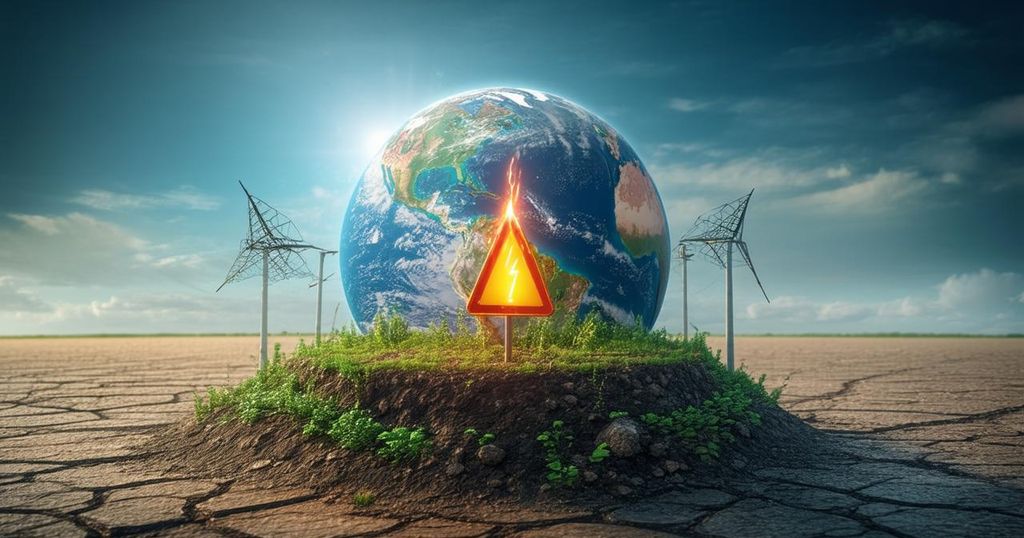The latest UN report indicates that without substantial action, global warming could exceed 3 degrees Celsius by 2100, far surpassing the 1.5 degrees target of the Paris Agreement. Recent data shows an increase in greenhouse gas emissions, and current progress towards climate goals is insufficient, particularly among G20 nations. The upcoming COP29 summit in Azerbaijan will focus on enhancing national commitments to address climate change effectively.
A recent United Nations report reveals that without intensified efforts to reduce greenhouse gas emissions, global temperatures are projected to rise beyond 3 degrees Celsius (5.4 degrees Fahrenheit) by the century’s end. This increase significantly surpasses the 1.5 degrees Celsius target established in the Paris Agreement of 2015, which aims to mitigate severe climate consequences. The annual Emissions Gap report indicates that current policy measures are insufficient, leading to an anticipated warming of 3.1 degrees Celsius (5.6 degrees Fahrenheit) above pre-industrial levels by 2100 if existing commitments remain unchanged. U.N. Secretary General Antonio Guterres emphasized the precariousness of the situation, stating, “We’re teetering on a planetary tight rope. Either leaders bridge the emissions gap, or we plunge headlong into climate disaster.” The report highlights a 1.3% rise in global greenhouse gas emissions from 2022 to 2023, amounting to a record 57.1 gigatonnes of carbon dioxide equivalent. Under the status quo, temperatures will likely increase between 2.6 degrees Celsius (4.7 degrees Fahrenheit) and 2.8 degrees Celsius (5 degrees Fahrenheit) by 2100. Particularly concerning is the lack of progress among the G20 nations towards their 2030 climate targets, as noted by Anne Olhoff, the chief scientific editor of the report. The world has already experienced an approximate warming of 1.3 degrees Celsius (2.3 degrees Fahrenheit), alarming implications underscored by the urgency of upcoming discussions at the 2024 United Nations climate summit (COP29) in Azerbaijan, where countries will aim to fortify commitments to transition from fossil fuels. To avert a rise beyond 1.5 degrees Celsius, the report calls for a collective commitment to reduce annual greenhouse gas emissions by 42% by 2030 and by 57% by 2035. Inger Andersen, Executive Director of the United Nations Environment Programme, strongly urged nations to seize the opportunity presented at the talks in Baku to enhance their Nationally Determined Contributions (NDCs), asserting that every fraction of a degree of warming avoided is crucial.
The topic of climate change has gained immense traction over the years, particularly in light of the increasing frequencies of natural disasters and the observable impacts on ecosystems and human populations. The Paris Agreement, a landmark international accord adopted in 2015, is pivotal in establishing a framework for nations to collectively tackle climate change, aiming to limit global warming to well below 2 degrees Celsius while striving for 1.5 degrees Celsius. The frequent assessments through reports such as the Emissions Gap report function to measure international progress against these targets and underscore the urgent need for enhanced climate action. With the world already experiencing about 1.3 degrees Celsius of warming, the implications for biodiversity, weather patterns, and global health are serious, necessitating immediate and sustained efforts from all nations, particularly the G20, which contribute significantly to global emissions.
The United Nations report underscores a critical warning about the trajectory of global temperatures, indicating that current commitments are inadequate to prevent catastrophic climate change. The findings highlight the necessity for enhanced global cooperation and more stringent emissions reductions. With the impending climate summit aimed at rejuvenating commitments under the Paris Agreement, it is imperative that nations take decisive actions to curb emissions, thereby safeguarding the planet’s future.
Original Source: clubofmozambique.com






